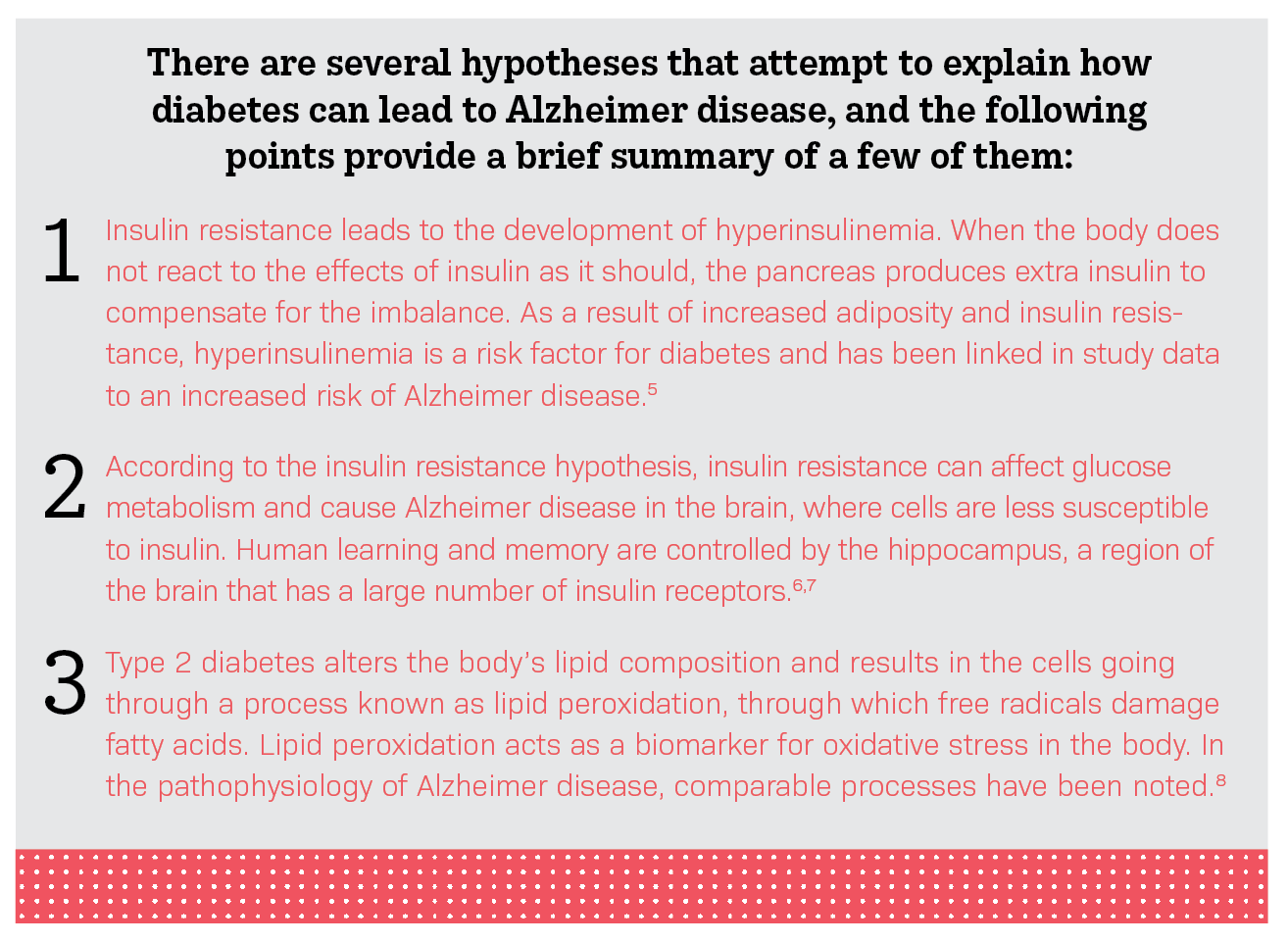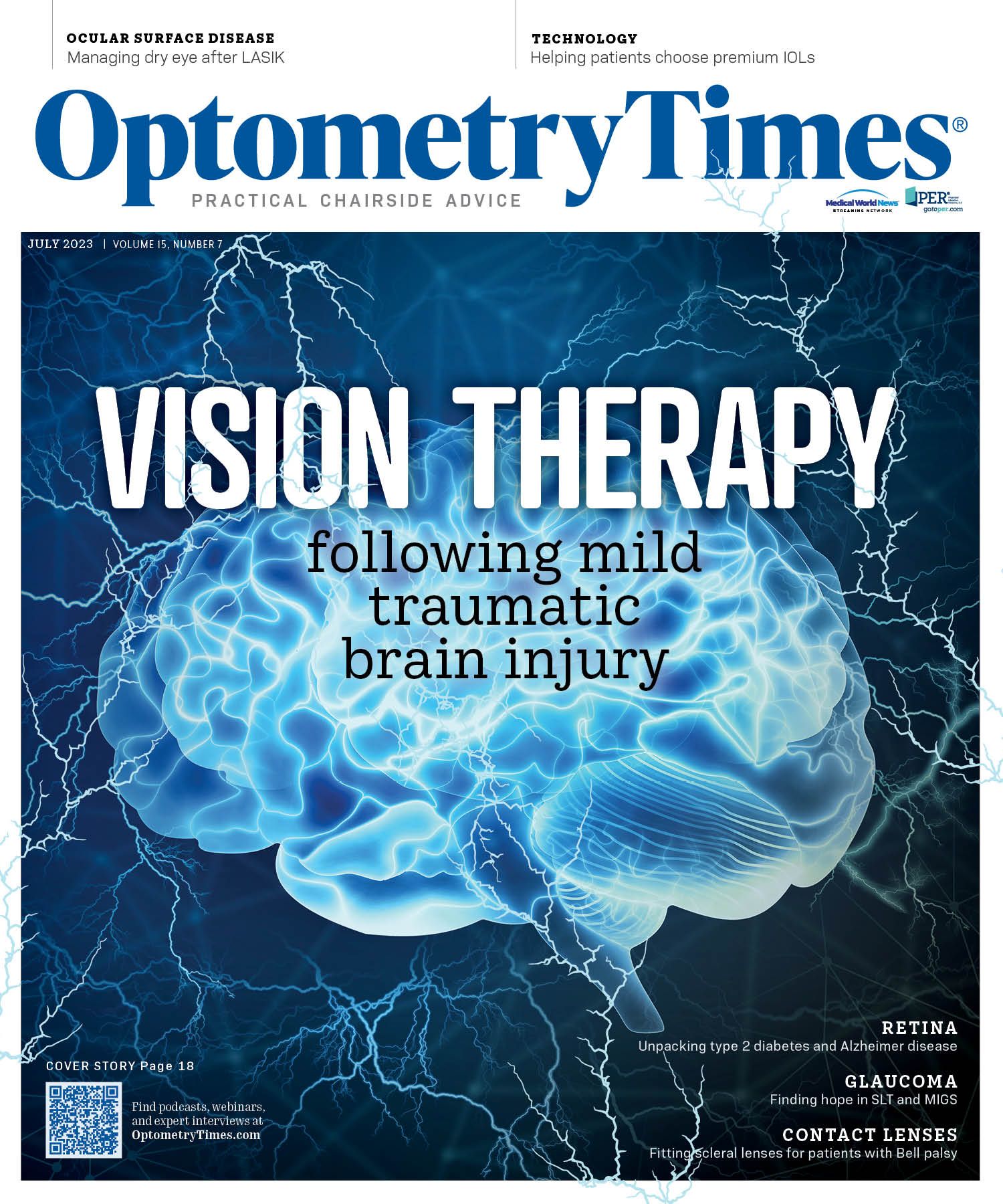What is type 3 diabetes?
Unpacking the connection between type 2 diabetes and Alzheimer disease.
Understanding the link between type 2 diabetes and Alzheimer disease as well as the future direction of type 2 diabetes research will enable optometrists to provide patients with a higher quality of care. (Adobe Stock / pikselstock)

At first glance, there may not appear to be a connection between type 2 diabetes and Alzheimer disease or other forms of dementia. However, a connection does exist, and the evidence supporting it is compelling enough that medical experts have started referring to Alzheimer disease as type 3 diabetes.
Diabetes and Alzheimer disease are 2 of the most prevalent diseases that affect the elderly population around the world. Diabetes is a chronic disease that impairs the body’s capacity to process glucose, which can lead to serious health complications. According to the CDC, 37.3 million people have diabetes, which makes up 11.3% of the US population.1 Alzheimer disease is a degenerative brain condition that causes damage to brain cells, resulting in memory loss and the impairment of other critical mental functions. It affects an estimated 5.7 million Americans, and rates of death from the disease increased by more than 50% between 1999 and 2014.2
Although results from a few studies have revealed an elevated risk of dementia in people with type 1 diabetes, substantial research has led researchers to draw strong conclusions about the relationship between type 2 diabetes and Alzheimer disease. An individual’s chance of developing Alzheimer disease may be increased by diabetes, according to research findings. The disease affects about 2 of every 1000 persons in the general population who do not have diabetes, and the rate rises to 6.25 per 1000 persons for those who do have diabetes.3 According to the findings of another study, those who have type 2 diabetes have a risk of developing Alzheimer disease that is around 60% higher than that of people who do not have diabetes.4

Despite the fact that having diabetes may raise the likelihood of developing Alzheimer disease, the condition does not necessarily manifest itself in every individual who has diabetes. There are many other factors that contribute to the development of Alzheimer disease such as age, genetics, and lifestyle. Alzheimer disease is not officially recognized as being equivalent to type 3 diabetes; however, one theory suggests there may be a relationship between diabetes and Alzheimer disease, which is being referred to as type 3 diabetes.
However, research on the possible connection between diabetes and Alzheimer disease is still in its early stages, and the exact nature of the link between the 2 disorders is not yet completely understood. For type 3 diabetes to become an official diagnosis rather than a theory based on correlation as it is presently, further study is necessary to find a stronger causality.
What does this mean for optometrists?
Almost every day in primary care and medical care settings, optometrists educate patients about the importance of blood sugar control. The link between diabetes and Alzheimer disease is something that can come up in the course of our discussions with patients about healthy lifestyle choices that can help prevent type 2 diabetes. Methods that have been shown to be effective in managing type 2 diabetes include the following9,10:
» Healthy diet: Having a diet rich in lean protein, whole fruits, vegetables, and whole grains and reducing added sugar and trans fat is beneficial. Drinking water rather than soda or juices that are high in sugar is recommended.
» Exercise: Being active multiple times a week promotes good cardiovascular health and increases the body’s sensitivity to the hormone insulin.
» Healthy weight: An increased risk of diabetes is associated with being overweight or obese. Mindful eating habits and a consistent exercise routine can help individuals to maintain a healthy weight.
» Smoking cessation: Smoking has been linked to a wide variety of diseases, and diabetes is no exception to this long list.
» Reduction in alcohol intake: As high levels of alcohol consumption have been linked to an increased risk of developing diabetes, it is recommended that individuals consume less alcohol or abstain entirely.
» Regular checkups with a primary care doctor and/or endocrinologist: It is imperative to take diabetes treatment seriously and attend all the follow-up appointments that the doctor recommends in order to slow the disease’s progression.
To reduce patients’ likelihood of developing type 3 diabetes, we can encourage patients to practice better disease management with these lifestyle changes.
The presence of both diabetes and Alzheimer disease can have a serious impact on a person’s health and ability to carry out daily activities. Alzheimer disease causes a gradual erosion of memory as well as a decline in function. Patients with both conditions may gradually lose the capacity to do tasks necessary for everyday living, including the ability to monitor and control blood sugar levels. Diabetes may be more likely to be poorly controlled in people with Alzheimer disease, which can lead to a number of additional health problems.

Optometrists are frequently the first medical professionals to suspect that a patient may have diabetes and are responsible for the ongoing management of diabetic retinopathy. Optometrists are familiar with the potentially vision-threatening signs of diabetic retinopathy. Given the increasing amount of evidence linking diabetes with Alzheimer disease, it may be beneficial to assess our older patients who have a diagnosis of dementia or who exhibit symptoms of cognitive decline for subtle indicators of diabetic retinopathy.
Understanding the link between type 2 diabetes and Alzheimer disease as well as the future direction of type 2 diabetes research will enable optometrists to provide patients with a higher quality of care.
References
1. National diabetes statistics report. CDC. Updated June 29, 2022. Accessed February 3, 2023. https://www.cdc.gov/diabetes/data/statistics-report/index.html
2. About Alzheimer’s disease. CDC. Updated June 6, 2018. Accessed February 3, 2023. https://www.cdc.gov/aging/publications/aag/alzheimers.html
3. Amidei BA, Fayosse A, Dumurgier J, et al. Association between age at diabetes onset and subsequent risk of dementia. JAMA. 2021;325(16):1640-1649. doi:10.1001/jama.2021.4001
4. Chatterjee S, Peters SAE, Woodward M, et al. Type 2 diabetes as a risk factor for dementia in women compared with men: a pooled analysis of 2.3 million people comprising more than 100,000 cases of dementia. Diabetes Care. 2016;39(2):300-307. doi:10.2337/dc15-1588
5. Luchsinger JA. Adiposity, hyperinsulinemia, diabetes and Alzheimer’s disease. Eur J Pharmacol. 2008;585(1):119-129. doi:10.1016/j.ejphar.2008.02.048
6. De Felice FG. Alzheimer’s disease and insulin resistance: translating basic science into clinical applications. J Clin Invest. 2013;123(2):531-539. doi:10.1172/jci64595
7. Ajmera R. What is the hippocampus? Medical News Today. Updated June 20, 2022. Accessed February 3, 2023. https://www.medicalnewstoday.com/articles/313295
8. Kandimalla R, Thirumala V, Reddy PH. Is Alzheimer’s disease a type 3 diabetes? a critical appraisal. Biochim Biophys Acta Mol Basis Dis. 2017;1863(5):1078-1089. doi:10.1016/j.bbadis.2016.08.018
9. Prevent type 2 diabetes. CDC. Updated September 30, 2022. Accessed February 2, 2023. https://www.cdc.gov/diabetes/prevent-type-2/index.html
10. Your game plan to prevent type 2 diabetes. National Institute of Diabetes and Digestive and Kidney Diseases. Updated February 2017. Accessed February 3, 2023. https://www.niddk.nih.gov/health-information/diabetes/overview/preventing-type-2-diabetes/game-plan

Newsletter
Want more insights like this? Subscribe to Optometry Times and get clinical pearls and practice tips delivered straight to your inbox.